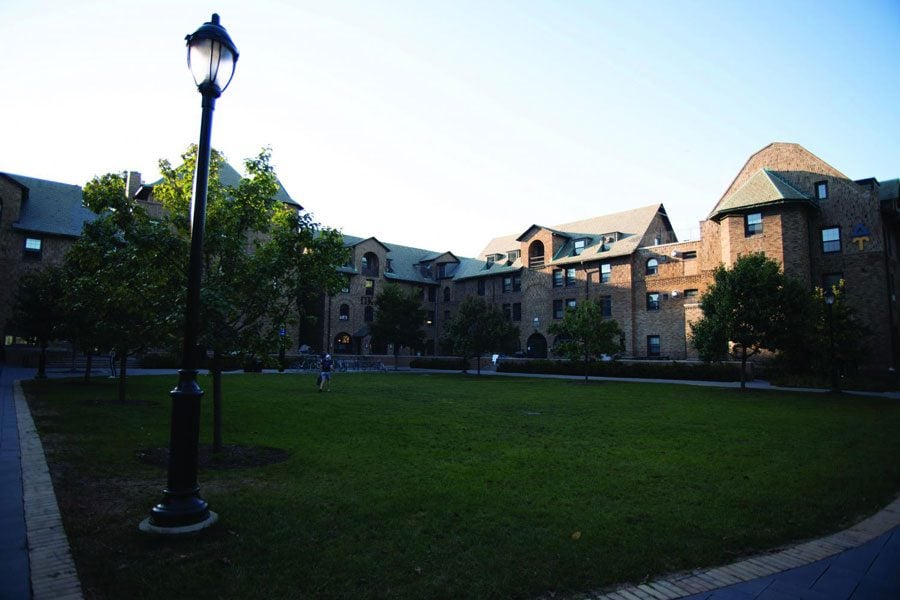Unpacking the student conduct process: How and why student organizations are suspended
Daily file photo by Colin Boyle
The fraternity quad. Three fraternities and two additional student organizations have been suspended by the University in the past two years.
January 13, 2019
While many people are familiar with fraternity suspensions, Greek organizations aren’t the only ones subject to the student conduct process. The University has cracked down on a variety of student organizations in recent years.
Twelve groups currently have a conduct status –– which means they are suspended, on probation or under conduct review, according to information available on the Office of Student Conduct website.
The number may seem unprecedented, but during mid-2017, there were more — at one point, 16 groups had a conduct status. However, this is the first time that four groups have been suspended by the University at one time, according to records that date back to January 2015.
Despite the prevalence of University suspensions and probations, most students are unaware of the process, said Lucas Christain, the director of student conduct — and it’s a “black box” he wants to illuminate.
The process
If the Office of Student Conduct receives information about a specific behavior that violates University policy — whether it’s underage drinking, hazing or drug use — a student organization will be put through the University Hearing and Appeals System process.
If there’s sufficient evidence that the organization violated a policy, the Office of Student Conduct sets up a hearing. Group leaders can choose between an administrative hearing, made up of a primary investigator and another hearing officer, or a panel hearing. Most organizations opt for the panel option, possibly because it allows students to be involved in the decision-making process, Christain said.
If the administrators or the panel find the group in violation of University policy, a group can be put on probation, suspended for a certain period of time or dissolved permanently.
The punishment
A probation is used to communicate to a group that its behavior is “significantly inconsistent” with University policy. Groups on probation are expected to take steps toward fixing any errant behavior but are often permitted to continue recruiting and holding events.
Suspensions, which usually last between one and four years, include “total restriction” on the organization and its members and prohibit events and recruitment. Groups must complete sanctions, which might include having members attend workshops or a restriction on certain activities, within a specified period of time to be allowed back on campus once their suspension is up.
But the impact of a suspension is largely determined by its length. That decision isn’t made using a specialized rubric or flowchart. UHAS panels and staff involved in administrative hearings make decisions on conduct outcomes case-by-case, taking into account any aggravating or mitigating factors, which could include a group’s past involvement with the Office of Student Conduct and how it handled any past violations.
Probation, for instance, is almost always considered an aggravating factor. Pi Alpha Phi received a three-year suspension in November after the fraternity had already been on probation.
But alcohol policy violations aren’t always grounds for suspending a group, said Travis Martin, the Office of Fraternity and Sorority Life director. He declined to comment specifically on Pi Alpha Phi’s case, but added that any organization serving alcohol to minors while on probation “will likely see a suspension.”
While Christain recognizes that this holistic way of decision-making often results in a more complicated process, he said he thinks it’s more fair.
“People want an ‘if this, then that,’” Christain said. “But the truth is, if we had ‘if this, then that,’ people would get angry.”
However, decisions made by UHAS panels and in administrative hearings do set a precedent, Christain said. Based on the most recent data, that precedent is a suspension of around three years.
That’s one of the reasons Sigma Alpha Epsilon’s suspension is so controversial. The fraternity was suspended for an alcohol violation in April 2017 and returned to campus in Fall 2018 on disciplinary probation and alcohol restriction. SAE was also on probation during the 2016-2017 academic year and under Title IX investigation in early 2017.
The transparency
Juliette Johnson, the Panhellenic Association president, said she thought the University likely didn’t have the information necessary to make SAE’s suspension longer, which was “infuriating.” Details on individual cases are not released to the public.
“It’s very hard not to have the transparency of how these decisions are made,” Johnson said. “It’s something PHA has been wishing for in the conduct process.”
While Christain recognizes students want to understand the discrepancies, he said it’s “too complicated” to simplify. He wants to make the general process more clear but declined to comment on any specific cases.
“I appreciate that people feel like us not sharing specific information is somehow us hiding something we don’t want people to know,” Christain said. “But it’s so hard to boil this stuff down. It’s not as simple as press a button and get an outcome.”
Email: [email protected]
Twitter: @cam_e_cook












